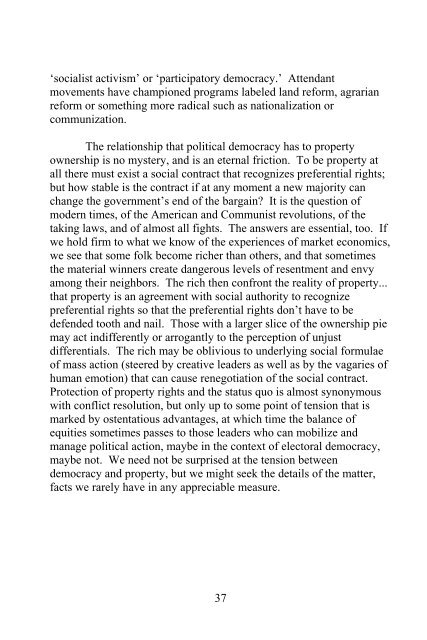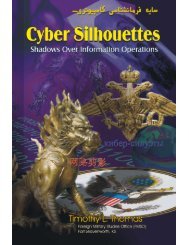- Page 1: Property & Peace:Insurgency, Strate
- Page 7 and 8: Chapter Five: What is to be Done? .
- Page 9 and 10: Author’s note regarding the subti
- Page 11 and 12: 4. Hohfeld versus HaushoferUS strat
- Page 13 and 14: Purpose and assertions“How could
- Page 15 and 16: where. A democratic society must kn
- Page 17 and 18: ecause of a demonstrated ability to
- Page 19 and 20: object, but a set of recognized rig
- Page 21 and 22: as an element in the social contrac
- Page 23 and 24: egarding property systems as they r
- Page 25 and 26: There is one more disclaimer and on
- Page 27 and 28: improvisational and unregulated cir
- Page 29 and 30: Figure 1. Horace’s Old LotFrom th
- Page 31 and 32: disrespect for the court as well as
- Page 33 and 34: the parties. In Leavenworth, the po
- Page 35 and 36: controlled by a municipal corporati
- Page 37 and 38: In other words, if we escape city w
- Page 39 and 40: of ownerships are, needless to say,
- Page 41 and 42: of owners is a problem involving th
- Page 43 and 44: The above examples tell us that sim
- Page 45 and 46: attached the lessons of that experi
- Page 47: When transaction costs to secure th
- Page 51: court order, can be lost in even th
- Page 54 and 55: From the urban conflict in Medellí
- Page 56 and 57: [sic] to have been the primitive sy
- Page 58: ownership problems. Internally, lim
- Page 61 and 62: accurate and correct. When that kin
- Page 63 and 64: fungible capital from one enterpris
- Page 65 and 66: Particularization of powerProperty
- Page 67 and 68: action. 36 Writing in the late 1950
- Page 69 and 70: neutralizing them requires an analy
- Page 71 and 72: International law quickly becomes p
- Page 73 and 74: context of public international law
- Page 75 and 76: middle-eastern fascists, and Islami
- Page 77 and 78: outlaws such as Colombia’s FARC t
- Page 79 and 80: We might call crimes of strategic m
- Page 81 and 82: North Korea’s conventional milita
- Page 83 and 84: A suitable term for the course of a
- Page 85 and 86: intelligence that the private eye o
- Page 87 and 88: The market of property rights is no
- Page 89 and 90: the government might limit his righ
- Page 91 and 92: convincingly establishes a causal l
- Page 93 and 94: discovered, in effect, that the inv
- Page 95 and 96: "In every civilized society propert
- Page 97 and 98: Nicolas sums up the slave’s posit
- Page 99 and 100:
the American Civil War. Few underst
- Page 101 and 102:
might exercise property ownership i
- Page 103 and 104:
agreement). The difference can be s
- Page 105 and 106:
200,000-400,000, are not active on
- Page 107 and 108:
demand further investigation into t
- Page 109 and 110:
or less primitive or advanced, but
- Page 111 and 112:
Within our domestic experience, we
- Page 113 and 114:
States -- increasingly as the Castr
- Page 115 and 116:
issue, and serving President Bush f
- Page 117 and 118:
claims, the more important question
- Page 119 and 120:
The property concerns of exiled Cub
- Page 121 and 122:
Some crisis predictions foresee vio
- Page 123 and 124:
activities that in turn provide cov
- Page 125 and 126:
ebellious expression. In the Americ
- Page 127 and 128:
sectors of Mexican society wanting
- Page 129 and 130:
Of all the deleterious effects that
- Page 131 and 132:
120
- Page 133 and 134:
The calculus of violence“Colombia
- Page 135 and 136:
organization. It is an omission tha
- Page 137 and 138:
quinine, ink, feathers, fur, flower
- Page 139 and 140:
geologic time, that marketable reso
- Page 141 and 142:
undercurrent, manifested and domina
- Page 143 and 144:
are strategic ownership plans. None
- Page 145 and 146:
description of their equivalent, te
- Page 147 and 148:
country) undertook a regional war a
- Page 149 and 150:
LandmineemplacementHighwayrobberyFA
- Page 151 and 152:
Doubloon at restCompartmentalized g
- Page 153 and 154:
Not, however, with the dedication a
- Page 155 and 156:
River valley), is a natural hub for
- Page 157 and 158:
Emerald smuggling is another tradit
- Page 159 and 160:
FARC and ELN, the product of direct
- Page 161 and 162:
Barrancabermeja area alone. 133 Con
- Page 163 and 164:
Law as legitimacyThe history of pro
- Page 165 and 166:
Colombia’s immediate post-colonia
- Page 167 and 168:
econciled. The cadastres are not up
- Page 169 and 170:
offices is directly related to hist
- Page 171 and 172:
(reportedly including dozens of who
- Page 173 and 174:
ut they each serve in a different w
- Page 175 and 176:
of less dramatic and more disperse
- Page 177 and 178:
suppose that the principal US milit
- Page 179 and 180:
Protected interior lines allowed th
- Page 181 and 182:
could hardly have been chosen. The
- Page 183 and 184:
government open land has also been
- Page 185 and 186:
property records convey. In essence
- Page 187 and 188:
Figure 5 Colombian minefieldsCompos
- Page 189 and 190:
The Colombian landmine environmenta
- Page 191 and 192:
force--and still successfully fines
- Page 193 and 194:
although this is clearly important
- Page 195 and 196:
locks, logistics has been a primary
- Page 197 and 198:
successful element. 180 From the Am
- Page 199 and 200:
northwest. 183 The Urubá/Atrato ar
- Page 201 and 202:
communication, etc. The municipios
- Page 203 and 204:
For outlaw groups, dominating speci
- Page 205 and 206:
organizations, geographic strategie
- Page 207 and 208:
democratic government is to fulfill
- Page 209 and 210:
in order to ease administration of
- Page 211 and 212:
Deserving to winNo one can feel as
- Page 213 and 214:
environmental protection. Today, th
- Page 215 and 216:
supposed to be one in which the gov
- Page 217 and 218:
much as four million hectares of la
- Page 219 and 220:
National Security Strategy of the U
- Page 221 and 222:
It is difficult to discuss strategy
- Page 223 and 224:
analysis’ as the chapter title al
- Page 225 and 226:
20 th Century, Britisher Halford Ma
- Page 227 and 228:
geopolitical theorist, Nicholas Spy
- Page 229 and 230:
(1) The worldwide interests, goals,
- Page 231 and 232:
decades prior. 214 Instead of conce
- Page 233 and 234:
a priori, continental control and w
- Page 235 and 236:
world in which military as well as
- Page 237 and 238:
importance of land to the American
- Page 239 and 240:
Even less physically visible are th
- Page 241 and 242:
territory and hold on to it indefin
- Page 243 and 244:
dominance-seeking nature of man. It
- Page 245 and 246:
population, many peoples expect the
- Page 247 and 248:
different potential owners. They di
- Page 249 and 250:
as those presented by Cline or Span
- Page 251 and 252:
eader of the present work more than
- Page 253 and 254:
of the 1930s, advocated massed bomb
- Page 255 and 256:
out." 244 Delbruck felt that Freder
- Page 257 and 258:
attack throughout the entire battle
- Page 259 and 260:
Unrestrained by borders and the tra
- Page 261 and 262:
change almost invariably conceals a
- Page 263 and 264:
sing to interrogators, even their m
- Page 265 and 266:
can block their routes of escape an
- Page 267 and 268:
In 1994, the Rwanda humanitarian cr
- Page 269 and 270:
simply to lower government morale a
- Page 271 and 272:
It should seem natural that informa
- Page 273 and 274:
and their containment. In addition,
- Page 275 and 276:
the specific rights that people hav
- Page 277 and 278:
The Zionist leadership concentrated
- Page 279 and 280:
In order to influence the lives of
- Page 281 and 282:
had been previously occupied by a f
- Page 283 and 284:
Developing a modern, formal land ow
- Page 285 and 286:
James Madison’s venerable words a
- Page 287 and 288:
countries. 279 Potential clean-up s
- Page 289 and 290:
territorial identities. Communist C
- Page 291 and 292:
terms a chance to revalidate Americ
- Page 293 and 294:
prioritized security concerns with
- Page 295 and 296:
National Intelligence shall ensure
- Page 297 and 298:
this office was created, the inform
- Page 299 and 300:
Something more obscure, such as leg
- Page 301 and 302:
The Domesday Book provides extensiv
- Page 303 and 304:
around the precise location and rep
- Page 305 and 306:
property laws, greatly facilitated
- Page 307 and 308:
mismatch between the theoretical un
- Page 309 and 310:
Property is a contract between soci
- Page 311 and 312:
Next on the component list for a pr
- Page 313 and 314:
system of ownership rules was fuele
- Page 315 and 316:
instrument is a product of demograp
- Page 317 and 318:
306
- Page 319 and 320:
Improvement of foreign property sys
- Page 321 and 322:
Hernando De Soto and his team of re
- Page 323 and 324:
failure to emphasize transparency i
- Page 325 and 326:
and nuclear engineering after World
- Page 327 and 328:
past decade or so has it been reaso
- Page 329 and 330:
International Property Rights Index
- Page 331 and 332:
they relate to each potential slice
- Page 333 and 334:
groups and individuals often depend
- Page 335 and 336:
The United States military has been
- Page 337 and 338:
presence of armed force. As Robert
- Page 339 and 340:
‘cadastre’ (catastro) was perha
- Page 341 and 342:
of organized malefactors is reduced
- Page 343 and 344:
ecognition of the importance of pro
- Page 345 and 346:
capital” indicated “the total a
- Page 347 and 348:
hemisphere are multi-faceted, mixin
- Page 349 and 350:
Region.’ 337 Among the document
- Page 351 and 352:
underlying causes of gross human ri
- Page 353 and 354:
víveres, una gallera, una joyería
- Page 355 and 356:
that property is consistently impro
- Page 357 and 358:
dangers of human contraband are pal
- Page 359 and 360:
questions of national security, how
- Page 361 and 362:
those contested rights and duties t
- Page 363 and 364:
associated with formal property pro
- Page 365 and 366:
354
- Page 367 and 368:
A. accuracyB. comprehensivenessC. t
- Page 369 and 370:
5. Professional standards of real p
- Page 371 and 372:
Beard, Charles A. The Idea of the N
- Page 373 and 374:
Commission on Integrated Long-Term
- Page 375 and 376:
Freedom House. Cuba in the Nineties
- Page 377 and 378:
Kent, Edward Allen, ed. Law and Phi
- Page 379 and 380:
Molano, Alfredo. Desterrados: crón
- Page 381 and 382:
Powelson, John P. The Story of Land
- Page 383 and 384:
U.S. Patent and Trademark Office. A
- Page 385:
St. Augustine, 64, 72, 81, 82, 83st
















